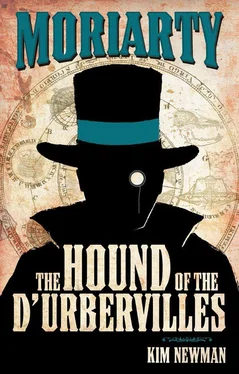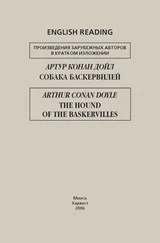Kim Newman - Professor Moriarty The Hound of the D'Urbervilles
Здесь есть возможность читать онлайн «Kim Newman - Professor Moriarty The Hound of the D'Urbervilles» весь текст электронной книги совершенно бесплатно (целиком полную версию без сокращений). В некоторых случаях можно слушать аудио, скачать через торрент в формате fb2 и присутствует краткое содержание. Жанр: Исторический детектив, на английском языке. Описание произведения, (предисловие) а так же отзывы посетителей доступны на портале библиотеки ЛибКат.
- Название:Professor Moriarty The Hound of the D'Urbervilles
- Автор:
- Жанр:
- Год:неизвестен
- ISBN:нет данных
- Рейтинг книги:5 / 5. Голосов: 1
-
Избранное:Добавить в избранное
- Отзывы:
-
Ваша оценка:
- 100
- 1
- 2
- 3
- 4
- 5
Professor Moriarty The Hound of the D'Urbervilles: краткое содержание, описание и аннотация
Предлагаем к чтению аннотацию, описание, краткое содержание или предисловие (зависит от того, что написал сам автор книги «Professor Moriarty The Hound of the D'Urbervilles»). Если вы не нашли необходимую информацию о книге — напишите в комментариях, мы постараемся отыскать её.
Professor Moriarty The Hound of the D'Urbervilles — читать онлайн бесплатно полную книгу (весь текст) целиком
Ниже представлен текст книги, разбитый по страницам. Система сохранения места последней прочитанной страницы, позволяет с удобством читать онлайн бесплатно книгу «Professor Moriarty The Hound of the D'Urbervilles», без необходимости каждый раз заново искать на чём Вы остановились. Поставьте закладку, и сможете в любой момент перейти на страницу, на которой закончили чтение.
Интервал:
Закладка:
In letters to the press, Moriarty medius tossed off accusations about his brother’s demise, which he laid at the door of ‘an unlicensed, semi-professional adventurer’. This Watson oik piped up with a spume of ‘most dangerous man in London’ piffle to exonerate his long-nosed, trouble-making former flatmate. Lawsuits were threatened. Arguments raged in clubs, letter columns and the streets.
In a battle which might interest scholars of modern urban warfare, the Conduit Street Comanche whipped the tar out of an irregular band of crybaby destitutes who pledged allegiance to the Watson’s departed mucker-wallah.
The third James Moriarty — with bloody cheek! — sold the Pall Mall Gazette personal, intimate memoirs of all the wickedness his brother the Professor was behind. Even with an Irish spinster scribbler as a ghost [47] As the author of Katie Reed: A Turbulent Life (Virago, 1988), I am satisfied that Moran here solves a significant mystery about the identity of the person with whom the feminist writer attempted collaboration in the summer of 1891. At some point, she — or another party — went through her journals and filleted the pages which cover this thorny business. We only know she was working as a ghost from the letters of her friend (and, later, lover) Charles Beauregard — to whom she complained extensively about her collaborator’s ‘uselessness, unreliability and octopus hands’. The assignment was thrust on Katharine Reed by Edward Tyas Cook, editor of the Pall Mall Gazette, on the still-commonplace principle of ‘do one for me now and I’ll give you something you want to do later’. Since 1988, a great deal of material about Reed — one of the most interesting women of the late nineteenth and early twentieth centuries — has come to light. It’s my hope that an enlightened publisher will eventually enable me to issue a comprehensively revised edition of my biography. Paul Forrestier’s What Kate Reed Did (University of Brighton Press, 2003) and Kim Newman’s ‘The Gypsies in the Wood’ (The Fair Folk, SFBC, 2005) are, respectively, inadequate and fanciful.
, Young James was unable to cough out anything publishable and became the only Moriarty ever convicted in court of anything. The Gazette had him up for breach of contract and reclaimed the advance fee.
Colonel Moriarty and the Fat Man of Whitehall — who turned out to be the brother of the Thin Man of Baker Street — exchanged cryptic, terse, bitter communiqués under the letterheads of the Department of Supplies and the Diogenes Club, respectively. No one outside ‘most secret’ circles will be allowed to read these until one hundred years after the death of someone called ‘Billy the Page’ [48] This would seem to refer to William Houlston (1882–1973). It took seven months of enquiries to find out which government departments presently fulfil the functions of the nineteenth-century Department of Supplies and the Diogenes Club. A D-notice prevents me from revealing even their current acronyms, though I have been given special leave to say that the Diogenes Club traded as Universal Exports in the 1950s which — at this stage of paranoia — inclines me to question whether this is true. Needless to say, attempts to ascertain whether either hold a bundle of red-taped documents marked ‘Sealed until 2073’ — let alone requests for premature access on academic grounds — have been unrewarding. A minor puzzle arises: if the exchanges were secret, how did Moran know they were ‘cryptic, terse, bitter’? Had he read them?
.
Holding myself aloof from this hullaballoo, I found it expedient to continue a continental holiday with pleasant companions. I followed the controversy via week-old newspapers left in hotel lobbies. Always good sport on the French Riviera. You can see North Africa from there, which offers exotic game and fragrant souks.
My longstanding curiosity about whether those Mississippi riverboat gamblers were half as sharp with the pasteboards as their reputation has it, still pricked. And, not satisfied by two go-rounds with the yeti (home court advantage helped neither of us to better than a draw each time), I still felt honour bound to make a third attempt at bagging a big shaggy mi-go pelt from the Himalayas.
Many — indeed, most — surviving members of the Firm were, by then, in police custody. Only one, Charlie Vokins of the Royal Opera House, came close to naming the Prof — whom he called Macavity — in his statement. He was subsequently killed in his cell, bitten by a venomous spider hitherto unknown outside the tropics. Its presence in Holborn has set the world of arachnology afire. The rest of the gang took a sensible ‘don’t know nuffink’ line from arrest to arraignment and beyond. Chop uttered only his name, which he shouted in response to every question — usually with a violent hand gesture.
It was said the Moriarty Firm was smashed completely, but you have to pay attention to who’s saying it. To whit… Scotland Yard, who’d only just been forced by this nagging Thin Man to admit such an outfit even existed. On the whole, the Yard would rather not have known about it because (adopt the proper brandy-soaked drone), ‘These things can’t happen in London, don’t you know, and if they can, they couldn’t last out the week because Great Britain has the finest police force in the world.’ Depressingly, this may be true — foreign rozzers generally make imbeciles like Lestrade, Mackenzie and MacDonald seem towering geniuses.
The only other person to declare the Firm defunct was a certain John H. — or James H., to cloud an already fogbound issue — Watson, MD, whose literary prospects had just washed over the Falls. I have it on good authority that The Strand doesn’t care to run reminiscences about beastly bad backs, mysterious gammy legs or interesting appendicitis.
Oh, we’d had setbacks, but I wasn’t the only one of the Firm in the wind. Parker the garrotter, for one, escaped notice. Simon Carne came up with another disguise, and posed as a private detective who swore to bring ‘that scoundrel Carne’ to book. ‘PC Purbright’ was working a scam with Filthy Fanny, shaking down monied toffs the faux waif accused of molesting her in Seven Dials. When the raid came, PCP mingled with the real coppers and ‘arrested’ Filth. He said he’d get her swiftly to the Yard for questioning. They hopped on the Brighton Belle and vanished from history. After a good wash and dressed in grown-up clothes, Filth would have been unrecognisable.
Mrs Halifax willingly confessed to crimes from gross indecency through baby-farming and living off immoral earnings to impersonating a Mother Superior, but swore up and down that the old gent and his military pal who rented her upper rooms were complete innocents and unaware of what went on at her now-notorious address. I like a trollop who knows her business — you don’t pay ’em just for the tumble, you also pay ’em to keep their mouths shut about it afterwards. Her girls were all credits to the oldest profession. It brings a tear to the eye, a tickle to the loins and an irresistible urge to check the inside pocket to see if the wallet’s still there when I think of any of ’em.
Polly Chalmers, ‘the occasional maid’, claimed she had just woken from a horrible dream and had no memory of the last seven years. Ceridwen Thomas, ‘Tessie the Two-Ton Taff’, put three constables in hospital (one permanently) during her arrest and swore no gaol cell could hold her (fit her, more like). Halina Staniewiczowa, ‘Swedish Suzette’, answered questions only in Polish, to the confusion of the Swedish interpreter Scotland Yard had brought in at great expense for her interrogation.
Wing Liu Tsong, ‘Lotus Lei’, was released after mysterious strings were pulled and got a job lighting joss sticks in Limehouse for the Lord of Strange Deaths… whom, truth to tell, she’d been working for all along; her new duties sound innocent enough, but you don’t know what happens to the mandarin’s guests if they don’t comply with his polite requests for cooperation or information by the time the stick has burned down.
Читать дальшеИнтервал:
Закладка:
Похожие книги на «Professor Moriarty The Hound of the D'Urbervilles»
Представляем Вашему вниманию похожие книги на «Professor Moriarty The Hound of the D'Urbervilles» списком для выбора. Мы отобрали схожую по названию и смыслу литературу в надежде предоставить читателям больше вариантов отыскать новые, интересные, ещё непрочитанные произведения.
Обсуждение, отзывы о книге «Professor Moriarty The Hound of the D'Urbervilles» и просто собственные мнения читателей. Оставьте ваши комментарии, напишите, что Вы думаете о произведении, его смысле или главных героях. Укажите что конкретно понравилось, а что нет, и почему Вы так считаете.


![Беар Гриллс - The Hunt [=The Devil's Sanctuary]](/books/428447/bear-grills-the-hunt-the-devil-s-sanctuary-thumb.webp)









